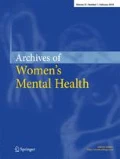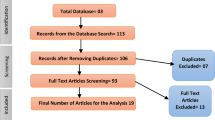Abstract
The goals of this research were to characterize suicidal behavior among a cohort of pregnant Peruvian women and identify risk factors for transitions between behaviors. The World Health Organization Composite International Diagnostic Interview suicide questionnaire was employed to assess suicidal behavior. Discrete-time survival analysis was used to study the cumulative age-of-onset distribution. The hazard function was calculated to assess the risk of onset of each suicidal behavior. Among 2062 participants, suicidal behaviors were endorsed by 22.6% of participants; 22.4% reported a lifetime history of suicidal ideation, 7.2% reported a history of planning, and 6.0% reported attempting suicide. Childhood abuse was most strongly associated with suicidal behavior, accounting for a 2.57-fold increased odds of suicidal ideation, nearly 3-fold increased odds of suicide planning, and 2.43-fold increased odds of suicide attempt. This study identified the highest prevalence of suicidal behavior in a population of pregnant women outside the USA. Diverse populations of pregnant women and their patterns of suicidal behavior transition must be further studied. The association between trauma and suicidal behavior indicates the importance of trauma-informed care for pregnant women.





Similar content being viewed by others
References
Appleby L (1991) Suicide during pregnancy and in the first postnatal year. BMJ 302(6769):137–140
Barrios, Y. V., Gelaye, B., Zhong, Q., Nicolaidis, C., Rondon, M. B., Garcia, P. J., … Williams, M. A. (2015). Association of childhood physical and sexual abuse with intimate partner violence, poor general health and depressive symptoms among pregnant women. PLoS One 10(1):e0116609. doi:https://doi.org/10.1371/journal.pone.0116609
Devries, K., Watts, C., Yoshihama, M., Kiss, L., Schraiber, L. B., Deyessa, N., … Team, W. H. O. M.-C. S. (2011). Violence against women is strongly associated with suicide attempts: evidence from the WHO multi-country study on women's health and domestic violence against women. Soc Sci Med 73(1):79–86. doi:https://doi.org/10.1016/j.socscimed.2011.05.006
Efron B (1988) Logistic regression, survival analysis, and the Kaplan Meier curve. J Am Sociol Assoc 83(402):414–425
Garcia-Blanco, A., Monferrer, A., Grimaldos, J., Hervas, D., Balanza-Martinez, V., Diago, V., … Chafer-Pericas, C. (2017) A preliminary study to assess the impact of maternal age on stress-related variables in healthy nulliparous women. Psychoneuroendocrinology 78:97–104. doi:https://doi.org/10.1016/j.psyneuen.2017.01.018
Gelaye B, Kajeepeta S, Williams MA (2016) Suicidal ideation in pregnancy: an epidemiologic review. Arch Womens Ment Health 19(5):741–751. https://doi.org/10.1007/s00737-016-0646-0
Geulayov G, Metcalfe C, Heron J, Kidger J, Gunnell D (2014) Parental suicide attempt and offspring self-harm and suicidal thoughts: results from the Avon longitudinal study of parents and children (ALSPAC) birth cohort. J Am Acad Child Adolesc Psychiatry 53(5):509–517 e502. https://doi.org/10.1016/j.jaac.2013.12.022
Hammerton G, Zammit S, Thapar A, Collishaw S (2016) Explaining risk for suicidal ideation in adolescent offspring of mothers with depression. Psychol Med 46(2):265–275. https://doi.org/10.1017/S0033291715001671
Kessler RC, Ustun TB (2004) The world mental health (WMH) survey initiative version of the World Health Organization (WHO) composite international diagnostic interview (CIDI). Int J Methods Psychiatr Res 13(2):93–121
Lahti, M., Savolainen, K., Tuovinen, S., Pesonen, A. K., Lahti, J., Heinonen, K., … Raikkonen, K. (2017) Maternal depressive symptoms during and after pregnancy and psychiatric problems in children. J Am Acad Child Adolesc Psychiatry 56(1):30–39 e37. doi:https://doi.org/10.1016/j.jaac.2016.10.007
Melville JL, Gavin A, Guo Y, Fan MY, Katon WJ (2010) Depressive disorders during pregnancy: prevalence and risk factors in a large urban sample. Obstet Gynecol 116(5):1064–1070. https://doi.org/10.1097/AOG.0b013e3181f60b0a
Newport DJ, Levey LC, Pennell PB, Ragan K, Stowe ZN (2007) Suicidal ideation in pregnancy: assessment and clinical implications. Arch Womens Ment Health 10(5):181–187. https://doi.org/10.1007/s00737-007-0192-x
Nock, M. K., Borges, G., Bromet, E. J., Alonso, J., Angermeyer, M., Beautrais, A., … Williams, D. (2008) Cross-national prevalence and risk factors for suicidal ideation, plans and attempts. Br J Psychiatry 192(2):98–105. doi:https://doi.org/10.1192/bjp.bp.107.040113
Nock MK, Borges G, Ono Y (2012) Suicide: Global Perspectives from the WHO World Mental Health Survey. Cambridge University Press, Cambridge
Plant DT, Barker ED, Waters CS, Pawlby S, Pariante CM (2013) Intergenerational transmission of maltreatment and psychopathology: the role of antenatal depression. Psychol Med 43(3):519–528. https://doi.org/10.1017/s0033291712001298
R Foundation for Statistical Computing (2015) R software (Version 3.1.2). Vienna, Austria
Raisanen S, Lehto SM, Nielsen HS, Gissler M, Kramer MR, Heinonen S (2014) Risk factors for and perinatal outcomes of major depression during pregnancy: a population-based analysis during 2002-2010 in Finland. BMJ Open 4(11):e004883. https://doi.org/10.1136/bmjopen-2014-004883
Rimkeviciene J, O'Gorman J, De Leo D (2015) Impulsive suicide attempts: a systematic literature review of definitions, characteristics and risk factors. J Affect Disord 171:93–104. https://doi.org/10.1016/j.jad.2014.08.044
SAS Institute (2016) SAS Analytics Pro 9.4. SAS Institute Inc., Cary
Usall, J., Pinto-Meza, A., Fernandez, A., de Graaf, R., Demyttenaere, K., Alonso, J., … Haro, J. M. (2009) Suicide ideation across reproductive life cycle of women. Results from a European epidemiological study. J Affect Disord, 116(1–2):44–147. doi:https://doi.org/10.1016/j.jad.2008.12.006
WHO (2014) Preventing suicide: a global imperative. Retrieved from http://www.who.int/mental_health/suicide-prevention/world_report_2014/en/. Accessed 1 Feb 2018
Wilson LM, Reid AJ, Midmer DK, Biringer A, Carroll JC, Stewart DE (1996) Antenatal psychosocial risk factors associated with adverse postpartum family outcomes. Cmaj 154(6):785–799
World Bank (2016) Adolescent Fertility Rates. Retrieved from Washington, DC: http://data.worldbank.org/indicator/SP.ADO.TFRT
Zhong, Q., Gelaye, B., Rondon, M., Sanchez, S. E., Garcia, P. J., Sanchez, E., … Williams, M. A. (2014) Comparative performance of patient health Questionnaire-9 and Edinburgh postnatal depression scale for screening antepartum depression. J Affect Disord, 162:1–7. doi:https://doi.org/10.1016/j.jad.2014.03.028
Zhong QY, Wells A, Rondon MB, Williams MA, Barrios YV, Sanchez SE, Gelaye B (2016) Childhood abuse and suicidal ideation in a cohort of pregnant Peruvian women. Am J Obstet Gynecol 215(4):501 e501–501 e508. https://doi.org/10.1016/j.ajog.2016.04.052
Acknowledgments
The authors wish to thank the dedicated staff members of Asociacion Civil Proyectos en Salud (PROESA), Peru and Instituto Materno Perinatal, Peru for their expert technical assistance with this research.
Funding
This research was supported by awards from the National Institutes of Health (T32-MH-093310 and R01-HD-059835). The NIH had no further role in study design; in the collection, analysis and interpretation of data; in the writing of the report; and in the decision to submit the paper for publication.
Author information
Authors and Affiliations
Contributions
Each of the authors has participated sufficiently in the preparation of this manuscript to warrant authorship.
Corresponding author
Ethics declarations
All participants provided written informed consent prior to interview. The institutional review boards of the INMP, Lima, Peru and the Harvard T. H. Chan School of Public Health, Office of Human Research Administration, Boston, MA, approved all procedures used in this study.
Conflicts of interest
The authors declare that they have no conflict of interest.
Research involving human participants
All procedures performed in studies involving human participants were in accordance with the ethical standards of the institutional and/or national research committee and with the 1964 Helsinki declaration and its later amendments or comparable ethical standards.
Informed consent
Informed consent was obtained from all individual participants included in the study.
Rights and permissions
About this article
Cite this article
Levey, E.J., Rondon, M.B., Sanchez, S. et al. Suicide risk assessment: examining transitions in suicidal behaviors among pregnant women in Perú. Arch Womens Ment Health 22, 65–73 (2019). https://doi.org/10.1007/s00737-018-0884-4
Received:
Accepted:
Published:
Issue Date:
DOI: https://doi.org/10.1007/s00737-018-0884-4



